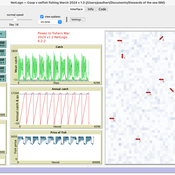
Paul Hart
Affiliations Professional homepagehttps://le.ac.uk/people/paul-hart
ORCID more infohttps://orcid.org/0000-0002-9188-2437
GitHub more infoNo associated GitHub account.
Paul Hart BSc (Liverpool), BA (Open University), PhD (Liverpool), MAE, FLS, FMBA. From 1973-1976 I worked on the Continuous Plankton Recorder (CPR) survey at the Oceanographic Laboratory, Edinburgh. From 1973 – 1976 I was employed by Nordreco AB (a Nestlé R & D company) in Sweden as a fishery biologist where he advised the Findus group on fish raw material supplies and assessed the future potential of aquaculture. In 1976 I moved to the University of Leicester as a lecturer in aquatic biology. My research focused on the foraging behaviour of fish with a side interest in marine commercial fisheries. I retired as Professor and Head of the Department of Biology and am now an Emeritus Professor. I was a Trustee of the Sir Alister Hardy Foundation for Ocean Science, which ran the Continuous Plankton Recorder Survey until it was merged with the Marine Biological Association: I then became a Trustee of the MBA. From 2010 – 2016 I was a member of the Science Advisory Board of Marine Scotland. I am co-author of Fisheries Ecology (1982) and co-editor of the two-volume Handbook of Fish Biology and Fisheries (2002). I was a co-editor of the journal Fish and Fisheries (Wiley) between 2000 and 2021.
Research Interests
IBMs of fisheries exploring management options and consequences of social behaviour.
Peer reviewed An IBM of a fishing fleet exploiting a pelagic resource and with a fisher management system. A preliminary version.
Paul Hart | Published Tuesday, March 19, 2024A fisher directed management system was describeded by Hart (2021). It was proposed that fishers should only be allowed to exploit a resource if they collaborated in a resource management system for which they would own and be collectively responsible for. As part of the system fishers would need to follow the rules of exploitation set by the group and provide a central unit with data with which to monitor the fishery. Any fisher not following the rules would at first be fined but eventually expelled from the fishery if he/she continued to act selfishly. This version of the model establishes the dynamics of a fleet of vessels and controls overfishing by imposing fines on fishers whose income is low and who are tempted to keep fishing beyond the set quota which is established each year depending on the abundance of the fish stock. This version will later be elaborated to have interactions between the fishers including pressure to comply with the norms set by the group and which could lead to a stable management system.
Under development.
